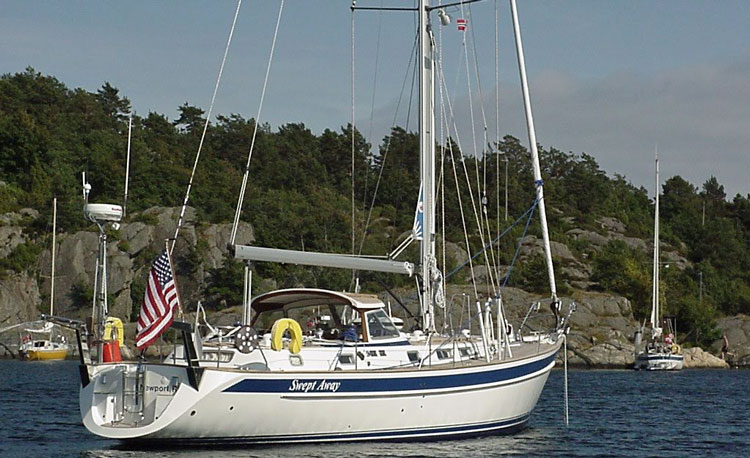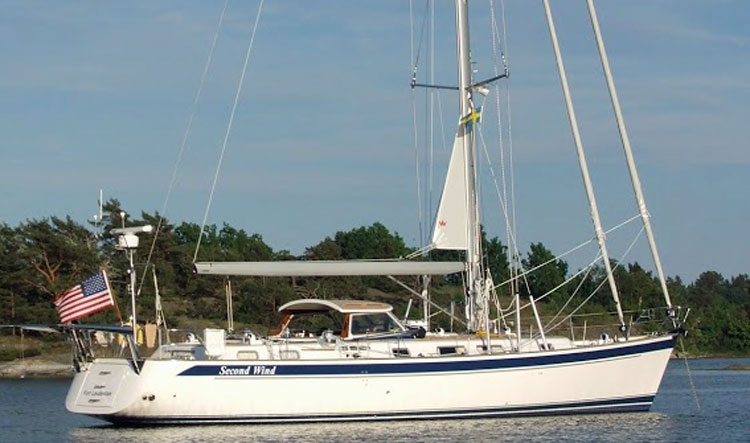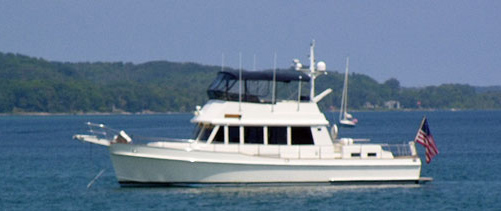 |
 |
 |
Sunday, July 4, 2010, in Craobh Haven, Scotland
Hi everyone. Happy Fourth! Last week we were on a mooring in Oban Marina, after our transit of the Caledonian Canal. We’re not far from there, in a village called Craobh Haven on a rainy, windy, and cold day.
The marina in Oban isn’t in Oban proper; it’s across a bay in Kerrera. In 1249, King Alexander II, the only Scottish king to take an invasion force all the way to the south of England, suffered a fever there and died. That’s the historical significance of the place. He survived the wrath of the Crown, but not Kerrera. There’s also Gylen, a ruined castle there, and from our spot on the mooring, we had a good view of the ruined Dunollie castle overlooking the sea across the way. They��re like lighthouses here, except without lights, or for that matter, a roof. All in all, though, the rolling hills all around are green and lush, and it’s a gorgeous backdrop.
To get to Oban proper, the marina runs a ferry. It leaves the marina on the hour, gets to town about 12 minutes later, and then goes back to the marina, filled with returning boat owners or Oban tourists who’d like to walk the 6-mile route around Kerrera. The only supermarket around is in Oban, a ferry ride away, and the ferry trip is only once per hour. When we get back to the marina, we then have to take our own dinghy out to the mooring. Art resigned himself to surviving on the ice cream already aboard.
There isn’t much to see in Oban, anyway, although the buildings in town provide an attractive panorama around the harbor. This isn’t as true for the fishing boats tied up on the wall, which all look barely seaworthy and appear to be constructed of rust. The rust doesn’t seem to rub off on the day’s catch, though. Seafood in town is fresh and delicious, and there are multiple appealing restaurant choices in town for lunch and dinner.
Our guests left us on Tuesday morning, and we spent the day putting the boat back together and replenishing our pantry. Rafting to a large training boat on the end of the dock facilitated their departure and our own lugging of laundry and groceries back and forth without bothering with the dinghy.
We didn’t need to travel too far on our next voyage, but we did need to get out of Oban. Very bad storms were predicted and neither the mooring nor the rafting was an appealing alternative in this poorly-protected harbor. The course went south for about ten miles, turned around a peninsula, and headed north for ten miles. Winds would be in our face on the way down and behind us on the way up, but they’d be light. The best navigational aid in our arsenal was the current, which we’d ride down through lunchtime, and ride back up.
Having a lift from the current means that you can tolerate nearly sitting still while you’re sailing. Our speed through the water varied from about two knots to four knots, and the current helped us to the tune of about two knots on the average. It was a short day, and in fact, we had to sail slowly to keep on the right side of the current. I felt like a message bottle bobbing in the sea, with a tiny rudder to sweep us around the point.
Art had picked a destination called Craobh Haven, untangled from the Gaelic as "Croove”, featuring a small marina with all the essentials, including protection. It sits at the foot of a village of century-old-looking, brightly painted holiday houses. The village commerce consists of a tiny general store, a darkly comfy pub, and a single daily bus to Oban. We prepared ourselves to be trapped by weather for a week in Epcot Scotland.
In some ways, we discovered, Craobh Haven is more old-fashioned than we imagined. The promised Wi-Fi at the marina was absent. But, we were assured, the pub just above the marina provided wireless access for free. After dinner, we tried it out. We could connect to the pub’s network, but there was no connection to the outside world. The waitress told us that 70% of Scotland had been down that day. I didn’t buy that, and Google News (my version of the Oracle of Delphi) hadn’t reported anything, but that explanation told me something about the local culture. Here we were in a place where people thought it was possible for most of Scotland not to have Internet service.
And another preconception was shattered. I’d always assumed that Scottish Gaelic, which had its roots in Irish Gaelic, would sound a lot like English. I figured that you could read it as though you were reading Beowulf or something. But there’s very little in common between the two languages at first glance, or even at the second one. I look at a Gaelic sentence underneath its English translation, and I can’t figure out which words might correspond to which other ones. It’s as different from English as Portuguese.
The next day, the Internet was back, in the pub, although it wasn’t all that much faster than the Internet on our boat. We tried to get television, but the analog signal was mostly fuzz and the digital box found dozens and dozens of channels, none of which would actually play.
We decided to walk to Ardfern the following day, a distance of about three miles. Ardfern is the place we’ll meet our next set of crew members, and the starting point for a flotilla we’ll join. Because of weather and other issues, it’s our plan to arrive in Ardfern well in advance of the flotilla’s start.
Art guided me to a dirt road that would lead us to Ardfern. A day of fine weather, it was neither cold nor hot, neither sunny nor overcast. We walked on the dirt and mud and avoided the many watery potholes. This wasn’t simply a stroll down a dirt driveway, and I was very happy that I’d decided against carrying our two laptops up and down hills for miles on end. There were vehicle tracks and occasional cars, but this street was rarely used by autos. Every so often, we’d have to select from two or three dirt paths, and we’d make our best guess. But the area never seemed to become developed, and we worried that we had wandered off of our course. Soon we encountered three women taking a dog for a walk from some distant home, and they assured us that we were still going in the right direction. Their parting words were “Keep asking people as you go!” This wasn’t so easy.
We finally passed a house on the dirt road, with a man fussing with a small tractor. He wore a woolen cap and was accompanied by a large dog. He looked like someone we’d encounter in Maine. We asked him if we were still on track to Ardfern, and I swear he said “Ay-yep!”
Ardfern isn’t a big place. It’s not even big compared to Craobh Haven. There’s a nice marina of medium size with good facilities and working Wi-Fi. There’s a bus stop right in the center (the bus stop at Craobh Haven is a good mile away from town.) There’s a village store, which serves as the post office. This store is bigger by half than its equivalent in Craobh Haven, but it’s still about the size of an American living room. There’s a schoolhouse that appears to have only one room. There’s a hotel with a good restaurant and a bistro that had been recommended highly by the only two sets of people we talked with in town. We opted for the bistro for lunch, had some discussions with the marina, and had someone call the local taxi to take us back to Craobh.
But the taxi was in Glasgow for the day, picking someone up. And that was it for a taxi. Fortunately for us, the taxi driver’s wife was on summer vacation from her job as a schoolteacher. She picked us up in her personal car and drove us back to the marina. Not being a taxi driver, and not knowing what the charge would be anyway, she refused to take money from us. And she already knew us, because she was one of the women we’d stopped on the road for directions.
The temperature here is in the low teens (that’s the mid-50s), but there’s lots of wind, and the rain helps cool things off. I hope that fireworks are sparkling where you are.
Love, Karen (and Art)